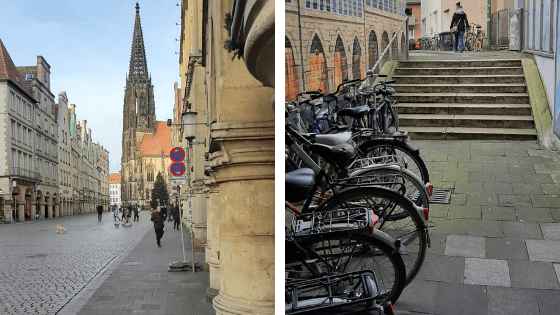The Limits of Transcreation: Billboards in a Secret Language
Else Gellinek
- January 27, 2020
- 5 min read
- Transcreation

Masematte, Münster’s secret language
I am a very happy resident of Münster, a medium-sized town in Germany known mainly for the ridiculous amount of cyclists and how often it rains. But Münster has more to offer: I recently wrote a guest blog (in German) about a secret language that used be spoken here.
I’m talking about Masematte, a Rotwelsch dialect. In its essence, it’s a collection of about 500 words sourced mainly from German, Yiddish, and Romany and used with German and Low German grammar. It was spoken by marginalized groups from the middle of the 19th century until about WWII. Speakers consisted to a large part of traveling craftspeople, vagrants, and cattle traders who eventually settled in Münster.
Masematte words were unintelligible to outsiders—hence the secret language. As a result, Masematte speakers could conduct secret conversations in front of outsiders without being understood. A boon in business meetings that may or may not have involved some shady deals.
Many Masematte speakers were Romany or Jewish and were murdered during WWII. As such, Masematte essentially became extinct even though a small number of construction workers in Münster kept the language alive on construction sites well into the 1960s.
Still, remnants of Masematte live on in speakers who heard the language spoken as children and in a smattering of words that have found their way into local colloquial German. Many of these words are so commonplace that people don’t even realize that they are Masematte words.
Masematte is currently experiencing a comeback. Some people simply like that it lets them get creative with compounds to form words for modern phenomena. Others relish the feeling of being in the know about a language that is understood only by the select few who live in Münster.
Understanding and using the modern reincarnation of Masematte is like a badge of honor worn by loyal residents of Münster– a town where many happily spend their entire life (including my husband, whose Masematte skills are pretty impressive).
A Masematte PR campaign

Last fall, Münster launched a new PR campaign for its climate initiative. The city wants to raise awareness and to actively involve residents. A series of billboards were installed that offered good ideas for environmentally conscious living. They featured an interesting linguistic choice: The taglines were in Masematte instead of German (or English, as is becoming increasingly common here in Germany). The city explained its reasoning for choosing Masematte: It’s something unique to the city and anyone who uses and understands it shows that they belong to Münster.
The image above shows several of the taglines that were displayed on the billboards. The tagline is in Masematte and the brief explanation below is in regular German. For instance Masematte “Pani auf die Leine” would be “Wäsche auf die Leine” in German, which means “Dry your clothing on the laundry line.” “Mucker heizen” is “Schlau heizen” in German and means “Be smart about how you heat.”
For non-speakers of German, it’s difficult to convey how this sounds to German-speaking ears in Münster. Masematte has a kind of impish charm to it. As a purely oral language, it also has an informal air to it, making the message especially lighthearted. A pleasant contrast to the weighty topic of saving the planet. Using Masematte transformed the message from a wagging finger to a friendly nudge. And Masematte did most of the heavy lifting.
The transcreation conundrum
Now imagine a benevolent millionaire were to approach you, asking you to transcreate the billboards for an American audience.
What’s interesting about this campaign is the linguistic device it uses to make the message go down more easily. Would you even be able to emulate the feeling this campaign evokes? Is there a purely oral language anywhere in the USA that might have a similar effect? I don’t think there is. I’m not even sure that you could do it for an audience in a specific American city with a distinct dialect of its own.
Yiddish speakers in the US might recognize a number of Masematte words that are still used in Yiddish. Would Yiddish be an option? I would wager that the history of Yiddish is much more well-known in the US than the history of Masematte is in Münster. Yiddish bears the weight of history whereas Masematte has been severed from it (which is not great). I don’t think that Yiddish could recreate the lightheartedness of the original billboards.
Can you think of any other ways to get a similar effect for an American audience—big or small? Cajun? But that’s tied to a specific ethnic group. Perhaps Pig Latin? Maybe that would make too many people feel excluded. How about a creole? Most creoles spoken in the US are still associated with very limited groups of speakers in a specific social stratum. Masematte, on the other hand, has lost its original connection to people on the outskirts of society. It is now recognized on all levels of society—albeit through historical ignorance instead of a process of conscious welcoming.
All in all, a tough nut to crack. This might just be the perfect example for a campaign that is so well-tailored to its target audience that you cannot make it work for any other audiences.
PS Lately I’ve been spending time thinking about transcreation and what I would do with campaigns that I encounter in my daily life in Germany. It’s a way of flexing my transcreation muscles. I’ll be posting some more about the thought processes these highly informal mental exercises involve as way of making the transcreation process more transparent. In that vein, you might find my thoughts on the transcreation of ALDI Christmas billboards interesting.


